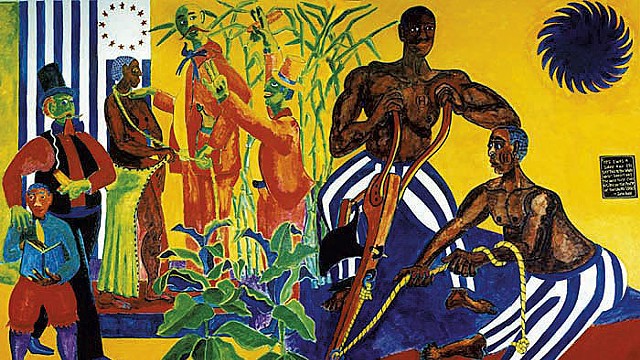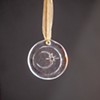click to enlarge 
- Courtesy Of Sam Kerson
- Section of the mural at Vermont Law School
Vermont Law and Graduate School is allowed to cover a controversial campus mural depicting enslaved people despite the artist’s objections, a federal appeals court ruled last week.
Artist Sam Kerson sued the school in December 2020, arguing that permanently concealing his work violates the Visual Artists Rights Act, a 1990 federal law that protects an artist’s work from "intentional distortion, mutilation, or other modification.”
The law school covered the mural with acoustic panels after previously
announcing in July 2020 it would paint over the controversial artwork. Students objected to the mural’s cartoonish portrayal of Black people and
framing of white people as “saviors” in the abolition movement.
Kerson had sought a preliminary injunction to prevent the school from
covering the mural while the suit was decided, which a district court denied in
March 2021.
The Canadian artist argued that concealing his work “destroys it for all intents and purposes” and could expose the murals to a potentially toxic environment behind the fabric-cushioned acoustic panels, according to court documents.
The three-judge panel did not agree, writing in an August 18 ruling that Kerson’s reading of the law “does not comport with any conventional understanding of the word ‘destruction,’” and “merely ensconcing a work of art behind a barrier neither modifies nor destroys the work.”
Steven Hyman, an attorney representing Kerson, expressed concern that the opinion could limit artists' rights to how their work is used.
"That you can take art and cover it ... is just undoing the whole purpose of VARA," Hyman said. "This opinion can be used more broadly against artists and giving more rights to the so-called 'property owners,' which was not the purpose of the statute."
The law school is “pleased with the decision,” Lisa Lance, a spokesperson
for the South Royalton school, said in a statement. “We believe [it] strikes the appropriate balance between the competing interests at stake.”
Hyman said the artist is "considering all options," including an appeal. An appeal of the decision would bring the case to the U.S. Supreme Court, which would decide whether to hear it.




















































